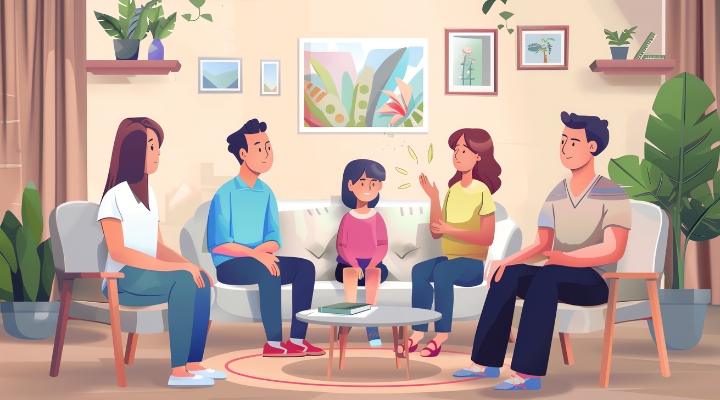How Family Therapy Can Support OCD Treatment: Involving Loved Ones in the Process

Obsessive-Compulsive Disorder (OCD) is a common mental health disorder that affects millions globally. It is defined by intrusive, unwanted thoughts (obsessions) and the overwhelming need to perform certain routines or actions (compulsions) to relieve the resulting anxiety. These symptoms can interfere with daily activities, relationships, and overall quality of life. While traditional therapy for obsessive-compulsive disorder often focuses on the individual, recent research and clinical practices have highlighted the importance of family therapy for OCD. Involving loved ones in the treatment process can provide crucial support and enhance the effectiveness of interventions.
The Role of Family in OCD Recovery
When it comes to OCD treatment support, the role of family members cannot be overstated. Families play a vital role in providing emotional support, understanding, and practical assistance to individuals struggling with OCD. By participating in family therapy for OCD, family members can learn how to better support their loved ones, manage their own stress, and create a more supportive home environment.
Family Involvement in Mental Health
Family involvement in mental health treatment isn’t merely helpful—it’s a vital component of the healing process. Studies have shown that when families are actively involved in the treatment process, individuals with OCD are more likely to adhere to their treatment plans and experience better outcomes. Family therapy for OCD helps to break down communication barriers, address any misconceptions about the disorder, and equip family members with the tools they need to support their loved ones effectively.
Best Practices in OCD Treatment
Cognitive Behavioral Therapy for OCD
Cognitive Behavioral Therapy (CBT) is considered one of the most effective and evidence-based treatments for Obsessive-Compulsive Disorder (OCD). This evidence-based approach helps individuals identify and challenge negative thought patterns and behaviors associated with their obsessions and compulsions. CBT often includes exposure and response prevention (ERP) therapy, where individuals are gradually exposed to their fears in a controlled manner, helping them learn to manage their anxiety without resorting to compulsive behaviors.
Involving Family in OCD Treatment
Incorporating family members into therapy sessions for OCD can significantly enhance the effectiveness of CBT and ERP. Family members can provide valuable insights into the individual's behavior, help reinforce coping strategies, and offer emotional support during challenging moments. By working together, therapists, patients, and families can create a comprehensive and supportive treatment plan.
Mental Health Counseling for OCD
Mental health counseling for OCD often involves a multidisciplinary approach, combining individual therapy, family therapy, and support groups. OCD support groups provide a safe space for individuals and their families to share experiences, gain support, and learn from others who are going through similar challenges. These groups can be particularly beneficial for family members who may feel isolated or overwhelmed by their loved one's condition.
Case Study: The Impact of Family Therapy
To illustrate the power of family therapy for OCD, consider the case of Ravi, a 25-year-old software engineer from Bangalore. Ravi had been struggling with OCD for several years, and despite trying various treatments, his symptoms persisted. His family, though well-intentioned, often felt helpless and frustrated, unsure of how to support him effectively.
When Ravi and his family began attending family therapy for OCD sessions at TMS Mindspace in Bangalore, they noticed a significant change. The therapist educated them about OCD, provided coping strategies, and helped them develop a supportive and understanding environment at home. Ravi's family learned how to reinforce the skills he was learning in therapy, and they became an integral part of his recovery process.
Within a few months, Ravi's symptoms began to improve. He was able to reduce his compulsive behaviors and experienced fewer intrusive thoughts. His family reported feeling more empowered and connected, and Ravi felt more supported and understood. This case highlights the importance of involving family in OCD treatment and the positive impact it can have on recovery.
Practical Tips for Family Members
Coping Strategies for OCD
- Educate Yourself: Understanding OCD and its symptoms can help you provide more effective support.
- Encourage Treatment: Support your loved one in seeking professional help and adhering to their treatment plan.
- Practice Patience: Recovery from OCD is a gradual process. Be patient and understanding as your loved one navigates their journey.
- Set Boundaries: While it's important to be supportive, setting healthy boundaries can help prevent enabling behaviors.
- Self-Care: Taking care of your own mental health is crucial. Consider joining OCD support groups or seeking counseling for yourself.
Emotional Support for OCD Patients
Providing emotional support is one of the most powerful ways to help someone with OCD.Offer a listening ear, provide encouragement, and acknowledge their emotions with compassion. Even small acts—like a warm hug, a gentle word, or a supportive smile—can have a powerful impact on someone’s mental well-being.
Conclusion
Involving loved ones in the treatment process is a crucial aspect of OCD treatment support. Family therapy for OCD can provide valuable insights, practical tools, and emotional support, enhancing the effectiveness of traditional therapies like CBT and ERP. At TMS Mindspace, we believe that a supportive and understanding family environment is essential for successful recovery.
If you or a loved one is struggling with OCD, consider reaching out to TMS Mindspace, the best OCD specialists in Bangalore. Our team of experts is dedicated to providing comprehensive and compassionate care, helping individuals and their families navigate the challenges of OCD and find lasting relief.


